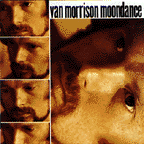
(click on cover image for larger version)  Sample, review, or order this CD now at Amazon.com
Sample, review, or order this CD now at Amazon.com
|
Moondance
Warner Bros. CD 3103
(Released March, 1970)
- And It Stoned Me (4:30)
- Moondance (4:35)
- Crazy Love (2:34)
- Caravan (4:57)
- Into the Mystic (3:25)
- Come Running (2:30)
- These Dreams of You (3:50)
- Brand New Day (5:09)
- Everyone (3:31)
- Glad Tidings (3:13)
Total time: (39:16)
Musicians:
Cissy Houston: Vocal
Judy Clay: Vocal/Vocal (Background)
John Klingberg: Bass
Jeff Labes: Organ/Percussion/Piano/Keyboards
Gary Malaber: Percussion/Drums
Tony May: Engineer
Van Morrison: Guitar/Guitar (Rhythm)/Keyboards/Saxophone/Tabla/Vocal/Producer
John Platania: Guitar/Guitar (Rhythm)
Elliot Scheiner: Engineer
Jack Schroer: Piano/Saxophone/Sax (Alto)/Sax (Soprano)
Neil Schwartz: Engineer
David Shaw: Clarinet/Percussion
Collin Tilton: Flute/Sax (Tenor)/Wind
Jackie Verdell: Vocal/Vocal (Background)
Shelly Yakus: Engineer
Review by Scott Thomas: 
Astral Weeks and Moondance are
so unalike, it is hard to believe they were created by the same person.
Where one is opaque, mysterious, improvised, spontaneous, and experimental,
the other is clear, explicable, arranged, rehearsed, and roots-conscious. In
fact, just about every aspect of Moondance, from song structure to
instrumentation, serves, perhaps unwittingly, to distance Morrison from the
earlier album. The Astral Weeks compositions, taking their cue from
folk and blues, were repeated sequences of simple chords, whereas the newer
pieces, deriving their inspiration from R&B and pop, sport choruses,
bridges, riffs, and hooks. As far as instrumentation is concerned, Astral
Weeks unveiled a sound that was truly original; a strange and seamless
knitting of blues, folk, rock, soul, jazz, and Celtic music.
Moondance veers closer to the soul and R&B of
Ray Charles, James
Brown, Otis Redding, and Curtis Mayfield. There's also the issue of studio
aesthetics. In Astral Weeks spontaneity was the order of the day.
Thus we have endearing imperfections like the out-of-time drumming at the
close of "Madame George." Moondance is flawless from start to finish.
Finally, there's Van himself. His performances on Astral Weeks, driven by the need to prove his talents as a singer (as if they needed proving), were constantly pushing at the strictures of meter, language, and vocal range. On Moondance he is a self-assured professional who, instead of dazzling his listeners with vocal pyrotechnics, is content with merely seducing them.
Instrumentally, the album's signature is the airtight harmonies created by Jack Schroer's alto and Collin Tillton's tenor saxes. Those who find these hauntingly melodic sax parts vaguely familiar will be hard pressed to find antecedents in R&B and soul: their true source lies in the whistles and pipes of traditional Celtic music. The guitar parts, both Morrison's rhythm strokes and John Platania's improvised leads, are, but for a few exceptions, performed on acoustic instruments, while the rhythm section recreates the deft but soulful touch of Roger Hawkins and Tommy Cogsbill on those great Aretha Franklin records. The final ingredient is a subtle jazz influence brought by Jeff Labes' fluid piano playing.
The opening cut, "And It Stoned Me," is a more compact and disciplined version of earlier stream of consciousness efforts like "Cypress Avenue" and "The Back Room" and brilliantly demonstrates Morrison's penchant for locating mystical enlightenment in even the most mundane occurrences. "Moondance," the second track, features one of Van's most scintillating melodies sitting high atop an urbane swing beat. Next up are "Crazy Love," an acoustic ballad delivered in an enchanting falsetto, and the show-stopper "Caravan." Taken together, these last two songs reveal the daunting scope of Morrison's songwriting and performing abilities. While "Crazy Love" is gentle and beautifully melodic, "Caravan" is a sweaty R&B work-out that, in the great tradition of James Brown, tantalizes its audience with a long-delayed and much-anticipated climax. As if this weren't enough, the first half of the album concludes with the transcendent "Into the Mystic." Here stanzas of yearning and wanderlust ascend toward choruses that communicate, with tremendous power, a kind of fevered mysticism. It is one of the single greatest recordings in all of popular music. Amazingly, the tracks that follow "Into the Mystic" are almost as good! We have a great slice of rhythm and blues ("Come Running"), the bluesy wit of "These Dreams of You," the gospel-tinged optimism of "Brand New Day," and, finally, "Glad Tidings," Morrison's delightfully eccentric take on Motown.
Part of the van-the-man.info unofficial website